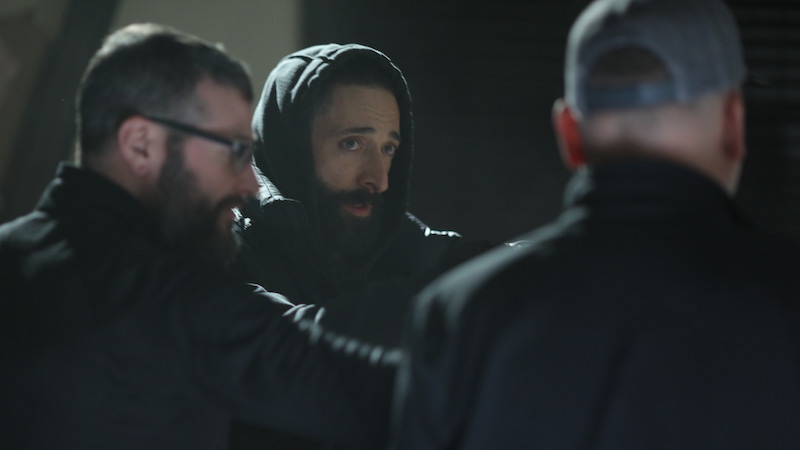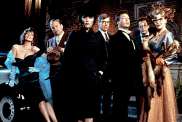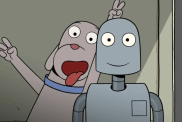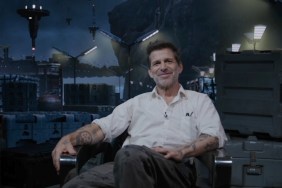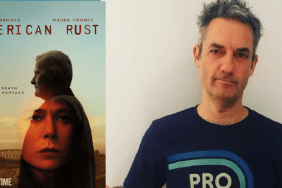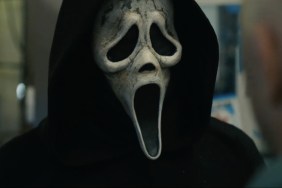IFC Films’ action thriller Clean, starring Oscar winner Adrien Brody, is out now in theaters and on VOD.
“Clean, a man with a violent and criminal past, seeks, redemption after being awakened by a personal tragedy,” reads the synopsis. “He dedicates his life to his broken community and the safety of a young girl who reminds him of his daughter. When her life is put in danger, it ignites, a return to the darkness and violence he’s worked so hard to leave behind. In his attempts to save her, he might very well save himself. ”
RELATED: Interview: Adrien Brody Discusses Clean, Scoring the Film, and Working with Austin Wintory
ComingSoon Editor-in-Chief Tyler Treese spoke with Clean director Paul Solet about his new film with Adrien Brody, the themes that it explores, and more.
Tyler Treese: I know you worked on Bullet Head with Adrien Brody. Was that the first you two had met or how did that working relationship start?
Paul Solet: Yeah, that was the first we met. At the time, Adrien was in the south of France painting. He’s also an artist and a musician. I think at the time he was just sort of taking the time away from movies and we sent him a script anyway and he really responded to it and we hit it off right away. I think we really sort of had very similar sensibilities and sensitivities and…we’re both from back east. We have similar upbringings and had a lot of tough people in our universes. So we had a shorthand right away, and I think after Bullet Head, we were excited to work on something else together. He had wanted to do something like Clean for a while, and he had a sort of a sense of a character, like a very clear visceral, emotional sort of a sense about feelings that he was having and finding unjust and infuriating in the world and…violence and the opiate crisis, s— like this. He wanted to channel it. That was sort of the genesis for Clean.
Can you talk about that collaborative process of writing this with Adrien? You guys collaborated before, but this is a whole different degree, and I feel like you kind of had to find your footing as collaborators.
Totally. Yeah, no, this is a very intimate sort of working relationship. It’s a tough movie. But the development process was actually pretty light, even though we both brought a lot of very personal themes to it. Not all of which are light themselves, but we started spitballing together. I went to see him in Manchester to finish some post-production on Bullet Head while he was doing Peaky Blinders, and we just walked around Manchester, kind of just dreaming and taking in this industrial city with all this history and drinking a lot of heavily caffeinated green tea and just kind of spitballing and dreaming together. We just kept it up, we would go our separate ways, do our separate work, compare notes when he was in L.A., we would meet up, we’d work, we’d grind some s— together, and then go our separate ways. When I would be in New York, we would walk around the city and spitball and find a spot to work. That was sort of how we did it. We just sort of iterated and iterated and iterated.
We both are very much concerned with seeking out any sort of pretentiousness or bulls—, and trying extinguish it and allow something better to come in its place. That was sort of the process. Clean is a…I love genre movies. I mean, I love action movies. I love horror films. I grew up with those movies, and I really am a real believer that if you do the work to have something honest under the hood, they just work so much better. If it’s a character you really believe has history and that you really care about, the stakes are much higher. I want to know what’s going on with this guy, I want to know where he came from, I want to know what happened. It’s a very different thing than just sort of exploitation, which…that stuff has its place, and there’s some really fun stuff, but that wasn’t our goal here.
I thought the film built really well to its big action scene at the end and there are just some brutal action scenes here. I’d love to hear about your approach. Deciding what to show, what to leave to the imagination, and how you came up with some of the action scenes here.
I appreciate that a lot. It’s a movie about a guy who’s like a savant at violence. It’s a movie about a guy who is a very bad guy who’s working his off to be a good guy, and what happens when you then give him a reason to be bad again, and the f–king beast that comes out. So those action scenes are very much an extension of who he is, you know, they’re character scenes. They’re brutal, ballistic scenes, but they’re sort of almost poetic. You get to finally get a window into sort of who this guy was when he was doing what he was doing, and it is fierce.
Adrien is a f–king force of nature in this movie. I think this movie will leave everybody really clear that he is entirely capable of being an action hero, and an action hero who still has what Adrien is already so respected for and known for, which is the ability to make a character real. Even a character who is as hard as this guy is, you get to see vulnerability in him. It’s a beautiful performance, I’m really proud of him.
Clean’s a really interesting character because he has that violent past and it’s interesting because, as you said, he’s trying to be a good guy and we have a very defined definition of good. So, do you view that as him relapsing, by going down this violent path? He kind of feels like he’s saving himself. What’s your read on that character arc and kind of embracing that violence when he has to?
That’s a great question. Really well articulated. Clean is obviously a guy who is sort of dually addicted in a weird kind of a way. You know, I don’t wanna sort of give too much away, but he has like kind of comorbidities in that way, and they are intertwined with each other. As is the case in real life, those things can be hard to untangle and they can affect each other. When one sort of starts to fall apart, the other can start to fall apart. He is absolutely a guy who is working extremely hard to resist the siren call of who he was.
You see it in that scene in the alley, where he comes upon a guy getting the shit kicked out of him by a group of guys, and it’s not the experience that you or I might have in that situation. He’s sort of drawn to it and, and called to it. It’s unique to him, there’s a sort of a past, and a lifestyle that’s sort of haunting him, and man is he working hard to get away from it. Anyone who has any experience with addiction and recovery. That stuff should speak to them. That stuff is very personal. [It’s] very personal to me in this movie. I loved how authentic he was and bringing a new sort of dimension and a take on that manifestation of addiction. Very interesting.
Can you speak to the film’s score that Adrien Brody did for the film?
The score is an Adrien Brody score that Austin Wintory, who is a dear, dear close collaborator of mine, he was the score producer. But Adrien scored Clean, and worked incredibly hard on that score. He really understood, as an actor who’s as obvious as savvy as he is, that a score is an opportunity to extend your performance [and] to affect your performance in a way that is just hugely f–king powerful. If you spend any time in editorial, you understand as a filmmaker that you can make or break a performance, you can amplify or undercut a performance in so many different ways using a score.
Adrien really utilized this as an opportunity to take even further what his vision for this character was. To extend the vision throughout post-production, in the same way that his being involved in production was an opportunity for him to extend the vision that he had for this character. [It was a] really interesting thing to see, and I think an unusual opportunity for an actor to be able to have, and really to fully exploit as he did.
